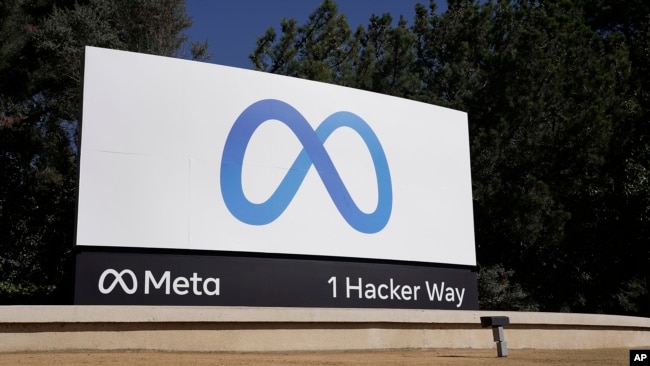巧妙に仕掛けられた偽サイト、フェイクニュース。
エンゲージメントしないよう、注意しましょう!!
VOAで英語を学びましょう!!
Meta、ロシアと中国のプロパガンダ活動を無効化したと発表(和訳)
Meta Says It Disabled Russian, Chinese Propaganda Operations
September 29,2022
フェイスブックは、同社のウェブサイト上で数百の偽アカウントを特定し、停止させたと発表しました。同社は、アカウントがウクライナ侵攻に関するロシアのプロパガンダを西ヨーロッパ全域に広めたと述べています。
フェイスブックの親会社であるメタは、ネットワークが本物の報道機関のウェブサイトのように見える60以上のウェブサイトを作成したと述べています。偽のウェブサイトには、英国のThe Guardian ガーディアンやドイツのDer Spiegel.デア・シュピーゲルに似たものがありました。しかし、偽のニュースサイトは、ウクライナについてロシア当局が使用するtalking points⬇️トーキングポイントを繰り返していました。
※talking points:主要なメディアが、私たちの頭にある考えを叩き込むために何度も何度も繰り返し使う、新しい造語や宣伝文句のことです。これらはしばしば虚偽または誇張であることが証明されるが、何度も繰り返されているため、その時点では誰もがそれを信じている。ーUrban Dictionary
https://www.serendipity.page/b/2019/11/talking-point/
メタ社は、多くの視聴者を獲得する前にこの作戦を止めたと言っています。しかし、フェイスブックは、侵攻が始まって以来発見されたロシアのプロパガンダ活動の中で最大かつ最も複雑なものであったと述べています。1,600以上のフェイスブックの偽アカウントが、ドイツ、イタリア、フランス、イギリス、ウクライナの人々にプロパガンダを広めるために使用されました。
「ビデオ:ブチャ(ウクライナのキーウ州の都市)の偽演出が明らかに!」と偽ニュースの1つを主張しました。この記事は、ロシアに占領された町で数百人のウクライナ人が殺害されたとして、ウクライナを非難するものでした。
偽のソーシャルメディアアカウントは、偽のニュースやその他の親ロシア派の投稿やビデオへのリンクを広めるために使用されました。このネットワークは夏の間中、活発に活動していました。
「ヨーロッパとアジアのロシア大使館の公式フェイスブックページによって、この作戦の内容が増幅されることが何度かありました」と、デビッド・アグラノビッチ氏は言います。彼はメタ社の脅威崩壊担当ディレクターです。「これはおそらく、今年初めにウクライナで戦争が始まって以来、私たちが阻止したロシア発の活動の中で最大かつ最も複雑なものだと思います。」
このネットワークの活動は、ドイツの記者によって最初に気づかれました。メタが調査を開始したところ、偽アカウントの多くはすでにフェイスブックの自動システムによって削除されていることがわかりました。今年初めに同ネットワークのフェイスブックページが無効化されたとき、何千人もの人々がフォローしていました。
研究者たちは、このネットワークとロシア政府を直接結びつけることはできなかったと述べています。しかし、この作戦は複雑で、複数の言語を使い、慎重に作られた偽のウェブサイトを使用していたと指摘しています。
2月の開戦以来、ロシアはウクライナに対する国際的な支援を弱めるために、ネット上の偽情報やconspiracy陰謀論を使ってきました。ロシア政府とつながりのあるグループは、ウクライナが攻撃を開始したと非難しています。また、米国の兵器開発が原因で戦争が始まったと主張し、ウクライナ人難民を犯罪者や強姦魔と呼んでいます。
ワシントンD.C.のロシア大使館に、メタ社の最近の行動への対応を求めるメッセージを送りましたが、すぐに返答は得られませんでした。
メタ社の研究者たちは、中国を拠点とする小規模なネットワークも発見しました。それはまた、米国で政治的な内容を広めようとしたものでした。
この作戦は米国の少数の視聴者にしか届かず、いくつかの投稿はたった1回のエンゲージメントを得ただけでした。多くは単純な英語の間違いなどでした。
※ engagement:ユーザーがツイートを見た上でいいねやリツイートなどの行動
メタ社は、このネットワークは、今年の中間選挙前に米国人をターゲットに政治的メッセージを発信した初めてのケースであり、注目に値すると言います。中国の投稿は、ある政党を支持するものではなく、政治的分裂を引き起こすような問題を狙ったものでした。
あるアカウントは、共和党のマルコ・ルビオ上院議員によって投稿されたフィスブック投稿にコメントしていました。ハッシュタグ#RubioChildrenKillerを使って、銃による暴力を止めるよう求めていました。
メタ社の脅威情報責任者であるベン・ニンモ氏は、次のように述べています。
「本質的にメッセージは’アメリカは悪い、中国は良い’でした 」と彼は言いました。”失敗したとはいえ、新たな方向性を示すものですから重要です”中国の偽情報操作のために、と彼は言っています。
Meta Says It Disabled Russian, Chinese Propaganda Operations
Facebook says it has identified and stopped hundreds of fake accounts on its website. The company said accounts spread Russian propaganda about the invasion of Ukraine throughout Western Europe.
Facebook parent company Meta said the network created more than 60 websites that looked like the websites of real news organizations. The false websites included one similar to The Guardian in Britain and Germany's Der Spiegel. But the false news sites repeated talking points used by Russian officials about Ukraine.
Meta said it stopped the operation before it was able to gain a large audience. However, Facebook said it was the largest and most complex Russian propaganda effort that it has found since the invasion began. More than 1,600 false Facebook accounts were used to spread propaganda to people in Germany, Italy, France, Britain and Ukraine.
“Video: False Staging in Bucha Revealed!” claimed one of the fake news stories. The story blamed Ukraine for the killings of hundreds of Ukrainians in a town occupied by the Russians.
The false social media accounts were used to spread links to the fake news stories and other pro-Russian posts and videos. The network was active throughout the summer.
“On a few occasions, the operation’s content was amplified by the official Facebook pages of Russian embassies in Europe and Asia,” said David Agranovich. He is Meta's director of threat disruption. “I think this is probably the largest and most complex Russian-origin operation that we’ve disrupted since the beginning of the war in Ukraine earlier this year."
The network's activities were first noticed by reporters in Germany. When Meta began its investigation it found that many of the false accounts had already been removed by Facebook's automated systems. Thousands of people were following the network's Facebook pages when they were deactivated earlier this year.
Researchers said they could not directly connect the network to the Russian government. But they noted that the operation was complex, using several languages and carefully created false websites.
Since the war began in February, Russia has used online disinformation and conspiracy theories to weaken international support for Ukraine. Groups linked to the Russian government have accused Ukraine of starting attacks. They have also claimed the war began because of U.S. weapon development and have called Ukrainian refugees criminals and rapists.
A message sent to the Russian Embassy in Washington, D.C., asking for a response to Meta's recent actions was not immediately returned.
Researchers at Meta also found a smaller network based in China. It also attempted to spread political content in the U.S.
The operation reached a small U.S. audience, with some posts receiving just a single engagement. Many had simple English language mistakes, for example.
Meta said the network is notable because it is the first to target Americans with political messages before this year's midterm elections. The Chinese posts did not support one party but were aimed at issues that cause political division.
One account commented on a Facebook post by Republican Senator Marco Rubio. It asked him to stop gun violence, using the hashtag #RubioChildrenKiller.
Ben Nimmo is the head of threat intelligence for Meta.
"Essentially the message was 'America bad, China good,'" he said. “While it failed, it’s important because it’s a new direction” for Chinese disinformation operations, he said.
Words in This Story
talking points –n. (usually pl.) particular subjects, ideas or topics for discussion
stage — v. to arrange or organize something to get attention
reveal — v. to show something that was hidden or unknown earlier
amplify — v. to increase the effect of something; to make something louder or more noticeable
disruption — n. to prevent some action from continuing
origin — n. the beginning of a series of events
conspiracy — n. a secret plan by two or more people to do something harmful or illegal
engagement — n. an interaction on social media
